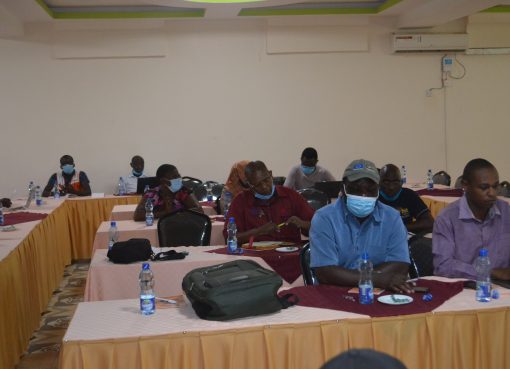He became a principal of a girls’ school soon after his graduation as a teacher from Kenyatta University in 1998.
Since then to date, he has been serving his students meals besides teaching English and Literature.
Mr. Clement Nyang’acha chuckles at the remembrance of being referred to as Mr. ‘Headmistress’ then, even as he serves food to his current students in Kebirigo Boys Boarding Secondary School.
What is so unique about Mr. Nyang’acha has been shaped over some time.
Visiting his school at mealtime, one would be forgiven to think that the teacher is one of the cooks as he will be clad in an apron and busy serving food to hundreds of learners.
“The air is always filled with excitement as students’ queue to be served their meals,” says Nyang’acha
The father of two says it all started when he was posted as the first Teacher Service Commission teacher in Isena girls’ secondary school in Kisii County, which had a population of 30 students then, and later, ended up becoming its first principal.
Nyang’acha says he started to serve the students with food to bring them closer to him.
He later realized it was not a big deal and replicated the same habit at all of the five schools he has so far headed, including the girls’ school, a mixed boys and girls secondary school, and two boys-only institutions.
The principal says the experience he received so far has taught him humility and to be innovative in dealing with young people, in a bid to end their challenges and propel them to the next level.
The Principal who is going through his 20th year in the profession narrates what he calls an exciting journey that has had its ups and downs.
After Isena where he stayed for seven years, he moved to Rigena PAG secondary school, for four years, then Sameta Boys High School, up to 2017 when he was transferred to a school in Siaya called Ugenya Boys High School that was only six years old.
After Ugenya where he stayed for five years, he was then moved to the current Kebirigo boys high school in Nyamira County where he is one month short of being one year old at the institution.
About the initial stages of heading a girls’ school, he says he was at first scared wondering how a man can head a girls’ school.
The school had poor infrastructure, and students were few, only 8 of them in Form one and 22 in Form two.
However, Nyang’acha says he settled to work and in the next year, enrollment had doubled to 60 girls and the population continued growing so that by the year 2005, he supervised the construction of the first laboratory from school savings and fundraising from well-wishers.
He later built 8 classrooms, 4 on the ground floor and four on the first floor.
Later the school attracted funding from the Africa Development Bank which besides building an office and some other structures, also gave bursaries to vulnerable families.
By the time he left the school, Nyang’acha says there were 251 girls out of whom at least 150 were boarders, the number having grown from three boarders.
Those days, he says, the boarders sought members of the community to keep them company at night for fear of staying alone overnight.
At Rigena mixed school Nyang’acha inherited 334 students when he took over in January 2011.
The school had achieved a mean of 6.7 which was the best for that school then, although this has been surpassed by his successor who is still there.
After that, he moved to Sameta Boys High School which he describes as having been on the brink of collapse because of frequent arson incidents which had reduced the school population to 207 from the previous 1600 by the time he took over.
But due to focus, teamwork, and concerted effort, three years later, Sameta had close to 700 boys.
Delocalization however saw Nyang’acha transferred from Sameta which had been elevated to extra county, to a County school, Ugenya Boys Secondary in Siaya County.
However, the school became an extra county too, before he was moved to the current Kebirigo boys high school in the year 2023.
He found out that the school had never achieved A plain since KCSE began to be sat in 1989.
He decided to mobilize the effort of all stakeholders and introduced a slogan dubbed Operation Grade A Lazinma (OGAL), and picked 21 boys from the total of 309 to mentor them towards achieving grade A.
This goal was realized when the school garnered two plain A’s by last year’s KCSE candidates triggering a rise in school population to 2000 from 1650 boys.
Looking back, Nyang’acha says years of experience, since he headed a girls’ school at the age of 31 years, has taught him that girls are more difficult to handle than boys and this has made him derive a formula to handle them.
He started serving them with four and finding time to stay with them to the extent that they started entrusting him with their issues more than his female counterparts.
“One time they informed me that I was better at keeping their secrets which protected them from embarrassment, unlike the lady teachers whom they accused of leaking out their confidential information,” Nyang’acha recalls.
A major challenge with boys, he says, is the use of drug addiction which is a major cause of criminal activities like arson which he once nipped in the bus at one of the institutions.
Serving students helps him connect with most of them who in return tip him whenever some students plan criminal activities.
He notes that serving them food also shows them a good example of humility which is very important for useful members in the community.
His Deputy Principal Academics James Ogari explains how his senior’s style of interacting with students has worked for him.
He applauds the move saying different principals at the institution have derived innovative ways of handling the students, which has continued to elevate the institution.
Clement Nyang’acha attended Maji Mazuri PAG primary school from class 1-8 before crossing over the fence to Maji Mazuri secondary school and was the only student that made it to university in 1981 before proceeding to Kenyatta University.
By Jane Naitore





